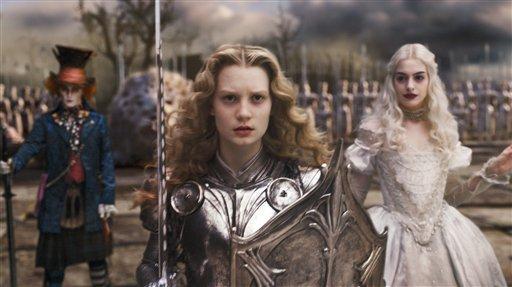Director Tim Burton, Johnny Depp and Helena Bonham Carter reunite in the latest adaptation of Lewis Carroll’s children’s classic “Alice in Wonderland.” Working with his staple cast — all three have collaborated in three previous films — Burton pulls off an enticingly shot, but otherwise limp, adventure.We have Alice (Mia Wasikowska) as a 19-year-old girl and an aspiring feminist about to be betrothed to a lord. She skips out on the onlookers during the ceremony and runs through a well-manicured garden maze chasing the White Rabbit before falling through a hole. Voilà, we are now transported to the beautifully unsettling Wonderland, where Absolem the Caterpillar (voiced by the superb Alan Rickman) puffs his hookah, the Red Queen (Carter) and White Queen (Anne Hathaway) fight to rule the kingdom and the Mad Hatter (Depp) is plain mad.It is necessary before proceeding to confess I have not read the book, and I watched the movie’s 2-D version. To the first, I maintain film adaptations of other forms of art must be able to stand on their own. Any comparison between source material and film version is salutary, but not crucial to the enjoyment or even understanding of film. If most films have screenplays, why should some of them be judged to a higher or lower standard simply because the source is popular? What is needed to judge a film is found only within the screen.To the second point, watching 2-D is a protest against the gradual infantilization of cinema, a resistance to the idea one should not watch a film, but rather “experience” it. Real life is all the experience one needs. But I digress.Burton vividly captures the otherworldliness, the strangeness and intrigue of Wonderland. The colors are riveting: the film features a walk in the forest like in “Avatar,” and even though it might look superb on 3-D, the golden mushrooms and the lavender flowers jutting out of the grey enveloped verdant forest remain eye-catching even minus one dimension. There nevertheless exists only emptiness when the audience has to look beyond the beauty of scenery — we’ve fallen through the donut hole. The characters struggle to acquire meaning from the script’s stolid straitjacket. The 19-year-old Alice has clearly outgrown the childlike wonder necessary to appreciate Wonderland, so the trip seems more about her trying to escape from the hole back to the real world. But Burton’s Alice can be appreciated even on this level as an example of Platonic anamnesis — learning as remembering. Alice is potentially or hardly Alice. She will have to learn to be herself.The major characters thrive on their eccentricity, delivering one-note performances disguised as unconventional and hip. Depp is praised for his versatility in balancing both smaller films (“Sweeney Todd”) and blockbusters (“Pirates of the Caribbean”), but it’s more likely both roles roll into each other: He simply imagines what the typical interpretation of a performance will be, then goes and does the contrary. This is why almost all Depp’s roles could be predicted even before the credits begin. He plays a lobotomized, serial-killer kind of mad in this film, exchanging pastoral ingenuity for unctuous listlessness. Meanwhile, Carter, a character actress with occasional depth, is left with over-the-top mannerisms, bellowing, “Off with his head.” It seems Hathaway stumbled on the wrong set — possibly she was originally to star in a high school version of “The Princess Diaries.”Does Burton need to skip popular adaptation and focus on original scripts? Should he jettison his familiar players and seek actors a tad more edgy and hungry? Or has the director of “Beetlejuice” lost his juice? “Alice in Wonderland” is by no means a fiasco, yet the joy of innocence is missing — the thrill of the unfamiliar noticeably absent.Freke Ette is a political theory graduate student from Uyo, Nigeria. You can follow him on Twitter @TDR_fette.—-Contact Freke Ette at fette@lsureveille.com
Freke Friday: Carroll’s ‘Alice’ lacks magic in Burton’s hands
March 11, 2010

In this film publicity image released by Disney, Johnny Depp, left, Mia Wasikowska, center, and Anne Hathaway are shown in a scene from the film “Alice in Wonderland.” Audiences are mad as hatters about Johnny Depp and Tim Burton’s “Alice in Wonderland,” helping it earn a whopping $41 million in its first day, Friday, March 5, 2010.




